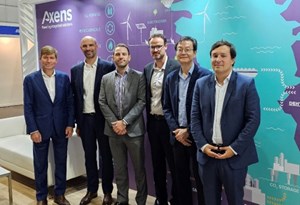DORIS, Axens, AWT International, SeaQuester and Surbana Jurong announce the CCS Hub Alliance decarbonization solution for hard-to-abate CO2 emitters

DORIS, Axens, AWT International, Sea-Quester Offshore and Surbana Jurong Infrastructure announce the formation of the CCS Hub Alliance, a partnership dedicated to delivering cost-effective and risk-reduced decarbonization solutions to hard-to-abate CO2 emitters.
With the timetable for penalties on hard-to-abate CO2 emitters being mandated in an increasing number of countries, the Alliance has been formed to provide reliable and economically viable decarbonization options.
One such decarbonization solution developed by the Alliance is the innovative CCS Hub Concept, representing a complete carbon capture and disposal supply chain:
- Onshore post-combustion CO2 capture and conditioning from hard-to-abate emitters
- Onshore CO2 transportation to port storage, export terminal and offloading facilities
- Marine CO2 storage and transport providing a floating pipeline concept to access a greater range of disposal options
- CO2 injection into sub-surface reservoirs with capability to screen offshore and onshore disposal options and assess re-purposing of existing production infrastructure
The CCS Hub Concept can be re-scaled and optimized to suit any project in any region, allowing the fast-track delivery of conceptual engineering, infrastructure costs and development plans to support clients’ decarbonization strategies.
The CCS Hub Concept solution is made possible by the partners’ extensive energy industry expertise and technology solutions across the entire CCS supply chain:
- DORIS, which leads the Alliance, is responsible for overall system integration and onshore CO2 transport, storage, and export facilities. With 60 years of experience in the energy industry, DORIS’ renowned gas process engineering capabilities and CO2 modelling expertise enables the company to design highly efficient and safe CCS facilities.
- Axens, a French licensor and technology provider, is responsible in the Alliance for CO2 capture and conditioning and will support the Alliance with its breakthrough DMX technology using a demixing solvent. This solution will contribute to optimizing the CO2 extraction value chain and reducing its energy intensity.
- Sea-Quester Offshore is responsible in the Alliance for floating storage and injection via its Carbon Harvester/PivotreeTM system. Their “floating pipeline” concept is in the final stages of approval and will facilitate an efficient, low-cost, high-volume sequestration alternative, capable of deployment within 18 months of FID.
- AWT International is responsible in the Alliance for CO2 sequestration reservoir analysis and injection well design. AWT has been delivering subsurface and well engineering studies / drilling project management services and contracting solutions to the energy industry for over 27 years.
- Surbana Jurong Infrastructure, an infrastructure design consultant, is responsible for designing the onshore infrastructure to support the agglomeration and transport of the CO2 from emitters in industrial zones to bunkering and terminal facilities port-side ahead of export to disposal sites.
Antony Loane, DORIS’ Business Development Manager for Asia-Pacific, commented, “The CCS Hub Alliance strongly benefits from its capability to cover the entire CCS supply chain from the emissions source to the point of disposal; this expertise enables us to deliver fully integrated and optimized infrastructure for our clients.
“We have observed that current CCS technologies are not economical at the large scale needed for regions such as southeast Asia, and this has inspired the CCS Hub Alliance to innovate and develop a cost-effective, reduced-risk decarbonization system suitable for heavy emitters, with a technology development timeline set for 2030 CO2 disposal date”.
Related News
Related News

- TotalEnergies and Mozambique announce the full restart of the $20-B Mozambique LNG project
- RWE strengthens partnerships with ADNOC and Masdar to enhance energy security in Germany and Europe
- Five energy market trends to track in 2026, the year of the glut
- Venture Global wins LNG arbitration case brought by Spain's Repsol
- Trinity Gas Storage reaches FID on Phase II expansion



Comments